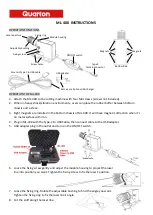
INSTALLATION
D.O. sensor
The temperature sensor built near
the galvanic D.O. sen-sor allows
stable temperature compensated
D.O. readings in a few seconds.
The thin permeable membrane isolates the sensor
elements from the testing solu-tion, but allows oxygen
to enter. Oxygen
that
passes through the membrane
causes a current flow, from which the oxygen
concentration is determined.
The
D.O. sensor is shipped dry. Activate
it before
installing the probe. To hydrate the sensor and
prepare it for use proceed as follows:
• Remove the black & red plastic cap. This
cap is used
for shipping purposes only
and can be thrown
away.
• Insert the O-ring in the membrane.
• Rinse the membrane with
HI7042S
electrolyte
solution while shaking it
gently. Refill with clean
electrolyte. Gen-tly tap the membrane over a
surface to
ensure that no air bubbles remain
trapped. To avoid damaging the mem-brane, do
not touch it with your fingers.
• With the sensor facing down screw the
cap
clockwise to the end of the threads.
Some electrolyte
will overflow.
• Insert the sensor in the probe body with
the right
alignment to the corresponding
white connector.
• With the supplied tool screw the locking
nut to fix
the sensor.
Conductivity sensor
The conductivity sensor uses
the 4-
ring technology that allows stable
and linear
readings without any
inter-ference in the whole range.
• Insert the sensor in the probe body with
the right
alignment to the corresponding
blue connector.
• With the supplied tool screw the locking
nut to fix
the sensor.
pH and pH/ORP sensor
The
pH and pH/ORP sen-sors are
gel filled and fea-ture cloth
junction, glass
and Pt sensors
respectively. The external plastic
body is built to last even in harsh
environmental conditions.
• Insert the sensor in the probe body with
the right
alignment to the corresponding
red connector.
• After mounting the sensors, screw the
protection
sleeve for taking measure-ments or the
transparent beaker for
performing calibration.
• With the meter off, connect the probe
to the DIN
socket on the bottom of the
meter by aligning the
pins and pushing
in the plug. Tighten the nut to
ensure a
good connection.
www.calcert.com
1.888.610.7664
0
5
10
15
20
25
30






















